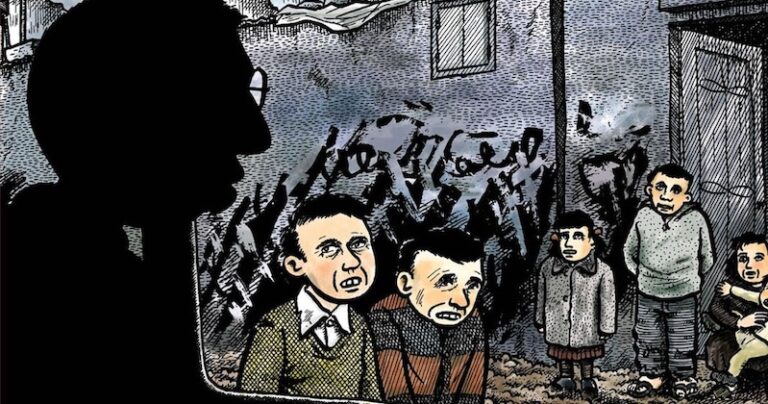
Palestine, Eisner Award-winning cartoonist Joe Sacco’s seminal nonfiction graphic novel about Gaza, which pioneered the medium of “comics journalism” upon its publication over twenty years ago, has been rushed back into print in response to surging demand.
First published across nine issues by Fantagraphics from 1993 to 1995, and then as a single volume edition with an introduction by the Palestinian American academic and critic Edward Said in 2001, Palestine is a record of Sacco’s own journeys around Gaza in the winter of 1991/92. Sacco spent this time meeting with Palestinians in the West Bank and Gaza Strip and the narrative focuses on the minute details of everyday life in these areas.
Sacco had intended to write and draw a comic book based on his experiences traveling through Palestine, but, as he told the Observer earlier this week:
…when I was there, my journalistic training kicked in and, more than just talking to people, I started interviewing them … I began approaching the topic more systematically, trying to understand the actual structure of the occupation and its effect on Palestinians. So the fusion of comics and journalism was organic. I had no theory of graphic journalism. I was making it up as I was going along.
Sales of Palestine were initially slow—largely because people didn’t seem to know what to make of it, or even how to categorize it—but the book went on to win an American Book Award, develop a strong cult following, and become a core text of university courses examining the conflict. As Said wrote in his introduction to the book: “With the exception of one or two novelists and poets, no one has ever rendered this terrible state of affairs better than Joe Sacco.”
Gary Groth, the co-founder of Fantagraphics, said that demand for Palestine has soared since the October 7 Hamas attack on Israel and subsequent bombing of Gaza:
We blew out of our inventory of several thousand copies quickly and are reprinting now. Retailers and wholesalers began ordering the book in far greater quantities than in the recent past, which indicates that every element down the chain—consumers and retailers—are expressing demand for it.
As the Observer reports, Sacco is happy that the book is reaching a new audience, but that’s tinged with a deep sorrow for the current plight of the Palestinian people:
That the book itself still has relevance is a sorry testament to the enduring tragedy of the Palestinians—though, in some ways, it’s also a tribute to their fortitude, their unwillingness to give in.
I would go back, if I could get in. Thankfully, many brave Palestinian journalists are doing exemplary work despite the appalling conditions and the very real danger to themselves and their families. But the main reason I would like to go back to Gaza is to see my friends there. I hope they will make it through this.
